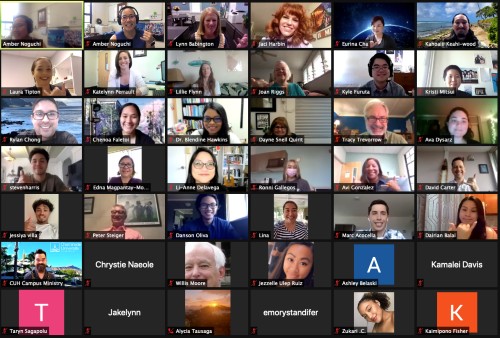
Chaminade undergraduates across all disciplines gathered virtually in early April to present their ongoing research across a broad array of exciting areas, from Native Hawaiian traditional medicine to data science database development to the microbiome, coral bleaching and cancer cell research.
The undergraduate conference, Na Liko Na‘auao, is an annual event at Chaminade to showcase exceptional original work by students seeking bachelor’s degrees and underscores the breadth and depth of academic scholarship at the University. Fields represented at this year’s conference, which included 23 presentations in all, ranged from Biology to Data Science to the Forensic Sciences.
The Na Liko Na‘auao symposium was first held at Chaminade in 2002.
Among the impressive topics students tackled this year:
- “Modeling The Microbiome Of Aa In Vitro Taro Digestion Model,” from Ava Dysarz
- “Seasonal Difference In Carcass Decomposition On Oahu,” presented by Marietta Lee
- And “Keawawa Water Analysis And Restoration,” from Dorie Sanborn and Trinity Young
Organizers say Na Liko Na‘auao not only gives undergraduates an opportunity to offer the broader University community a glimpse into what they’re working on. It also gives them a chance to hone their presentation and speaking skills, synthesizing their research for a general audience.
The public forum also gives students an opportunity to take questions, giving them insight into their research strengths along with potential areas for improvement, further exploration and collaboration.
Also at Na Liko Na‘auao, the recipients of two prestigious Chaminade awards were announced.

The President Sue Wesselkamper Prize, which recognizes a student who has displayed academic scholarship beyond the classroom and has a record of service learning volunteerism and leadership, was awarded to Data Science student Dairain Balai, who is also minoring in Biology and Criminal Justice.
In nominating her for the award, Data Science program Director Dr. Rylan Chong said Dairain has participated in a host of leadership and research growth opportunities—and excelled in each of them.
And her work is already getting noticed. To continue her research on Native Hawaiian women’s health, Dairain was selected for a competitive spot as a paid research assistant at the University of Texas in Austin Texas Advanced Computing Center, where she is also serves as a mentor to other students.
Chong said Dairian, who graduated from Waianae High and is a Ho’oulu Scholar, “represents what Chaminade is all about locally, in her community, and on the mainland by going beyond the expectations of her service to community and education, development of her moral character, personal competencies, and commitment to build a more just and peaceful society.”

Also announced at the event: the recipient of the President Mackey Prize, which recognizes a faculty member at Chaminade with a record of student mentoring and a strong, ongoing commitment to providing students with research or creative experiences that go beyond the classroom.
This year’s awardee: Dr. Kate Perrault, an assistant professor of Forensic Sciences and Chemistry.
Undergraduate researcher Danson Oliva nominated Perrault for the honor, saying the professor is “extraordinarily passionate about the course material and wants every student to succeed.” Oliva added that working in a lab under Perrault has been a wonderful growth experience, allowing her to flex her scholarship muscles while also getting helpful and instructive feedback and mentoring.
“As a research mentor, she guides us but also helps us troubleshoot problems when they arise,” Oliva wrote. “With the help of Dr. Perrault, I have gone on to give two conference presentations on my project. It wouldn’t have happened if Dr. Perrault didn’t truly believe in our ability to succeed.”



